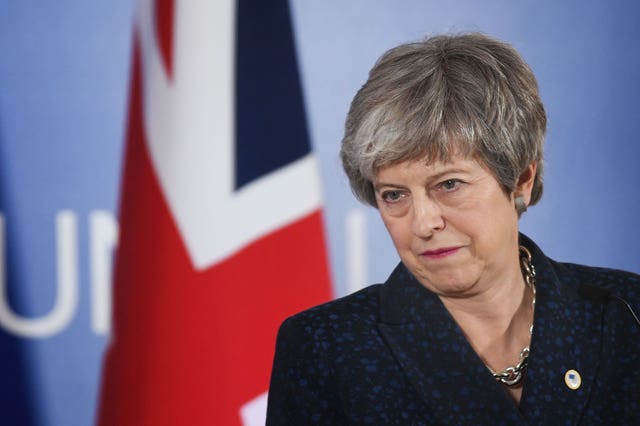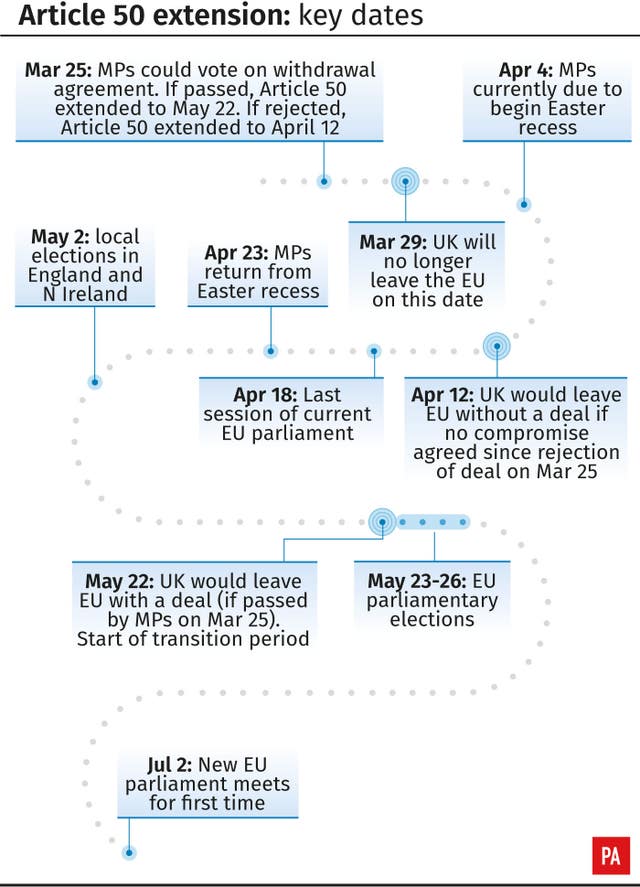Theresa May faces Tory MPs’ anger over Brexit delay
The PM faces calls to consider her position after EU leaders agree to extend the Article 50 withdrawal process.

Theresa May has returned to face the fury of Tory MPs after EU leaders agreed to delay Brexit to give her a final chance to get her deal through Parliament.
Following late-night talks in Brussels, the Prime Minister said the plan would enable the UK to leave in an “orderly manner” in little over eight weeks time.
But amid signs her authority is crumbling, there were open calls for her to quit as MPs voiced their anger that Brexit will not go ahead on March 29 as planned.
One backbencher warned next week would be a “defining moment” for her premiership and urged her to consider her position.
It followed reports that the chairman of the backbench 1922 Committee, Sir Graham Brady, visited her in No 10 on Monday to inform her of the discontent after being “bombarded” with texts calling for her to quit.
Meanwhile pro-EU MPs have launched a fresh attempt to take control of the Commons business in a bid to secure a “softer” Norway-style Brexit.
Under the plan set out at the EU summit, leaders agreed to extend Brexit to May 22 if Mrs May can finally get MPs to back her deal in a third Commons “meaningful” vote.

However, if she fails the UK will have to set out an alternative way forward by April 12, which could mean a much longer delay – with the UK required to hold elections to the European Parliament – or leaving without a deal at all.
Following defeats by 230 votes in January and 149 votes last week, both pro-EU MPs and Brexiteers warned that she was heading for another heavy reverse.
Nigel Evans, the pro-Brexit executive secretary of the 1922 Committee, said she had made a “big error” in agreeing to a delay, adding pointedly she needed to consider what would be her legacy if she failed to deliver Brexit.
“It has become a bit of a farce,” he told BBC News.
“When she leaves Downing Street – and a lot of people think it is not going to be long now before she does – what sort of legacy is she going to leave behind?”
Backbencher Steve Double said the Prime Minister was “isolated” and that there were “many people” in the party at Westminster who now wanted her to go.
“I think it is quite clear that she is not leading her party. She is isolated, sadly, from a majority of the parliamentary party now,” he told the Press Association.
“We need to find a way forward and I think that requires new leadership . I know that many people feel that next week is a defining moment and I would very much hope that she would reflect on her position.”
Nigel Dodds, the deputy leader of the DUP whose votes are likely to be crucial if Mrs May is to get her deal through, said she had failed to secure any change to the Northern Ireland backstop, which it bitterly opposes.
“Nothing has changed as far as the Withdrawal Agreement is concerned. We will not accept any deal which poses a long-term risk to the constitutional and economic integrity of the United Kingdom,” he said.
However Tory grandee Ken Clarke warned that a Conservative leadership contest at such a crucial moment would be highly damaging.
“The world would finally decide that the British and their political system had gone mad if we all broke off to have six weeks of a bloody leadership campaign that would probably produce somebody who has no more chance than she has of unifying the party,” he told BBC Radio 4’s The World at One.

Meanwhile, ministers moved to try to head off a fresh cross-party attempt by MPs to take control of the Commons order paper, amid fears the Government is facing another damaging defeat in a vote on Monday.
A group including Tory former ministers Sir Oliver Letwin and Dominic Grieve, and the Labour MP Hilary Benn, have tabled an amendment to allow the Commons to stage a series of “indicative votes” on the alternatives to Mrs May’s deal.
However, Business Secretary Greg Clark stressed that David Lidington, Mrs May’s de facto deputy, had already promised the Government would enable the House to come to a view on the various options if her deal is rejected.
“The Government will provide that so there is no reason why the Government should be forced to do something which it is committed to do anyway,” he told the BBC.
Earlier Brexit minister Kwasi Kwarteng said it would be “surprising” if MPs were not given a free vote in that situation, however the prospect produced a furious response from Tory Brexiteers.
Steve Baker, the deputy chairman of the European Research Group, tweeted: “National humiliation is imminent through these ‘indicative votes’.”
Earlier aides confirmed Thursday’s agreement meant a no-deal Brexit was no longer a possibility on March 29, but stressed that it remained on the table if MPs have not approved the Withdrawal Agreement by April 12.
The format increases pressure on Leave-backing MPs to row in behind Mrs May’s deal, for fear that if it falls, the UK could find itself electing new MEPs and remaining for months or years within the EU.
Downing Street was unable to say on which day the Government would seek to bring back the Withdrawal Agreement for a third “meaningful vote” – known in Westminster as MV3.
But sources confirmed that Mrs May will table secondary legislation to remove the date March 29 from Brexit laws.
Speaking at the end of the European Council in Brussels, French president Emmanuel Macron said Brexit is more a “political lesson” than a lengthy technical negotiation.
Mr Macron said the failure by Britain to deliver Brexit more than two years after deciding to leave the bloc proves that “a proposition to leave Europe without a project leads to an impasse”.
But he insisted that governments should listen to their people if they want to avoid a “disaster”.
He said: “We should respect what the British people have decided. We need to hear our people, we need to address their fears. We can’t play with fears, or simply tear up pages without offering anything else.”
Mr Macron warned in the case of a no-deal Brexit, the first victims would be Britain’s less well-off.
“We would continue to have a strong relationship with the United Kingdom,” he said. “I’m not rejoicing at all. It’s terrible.”





